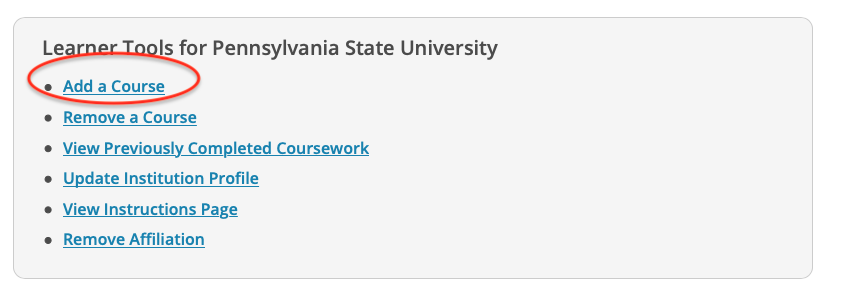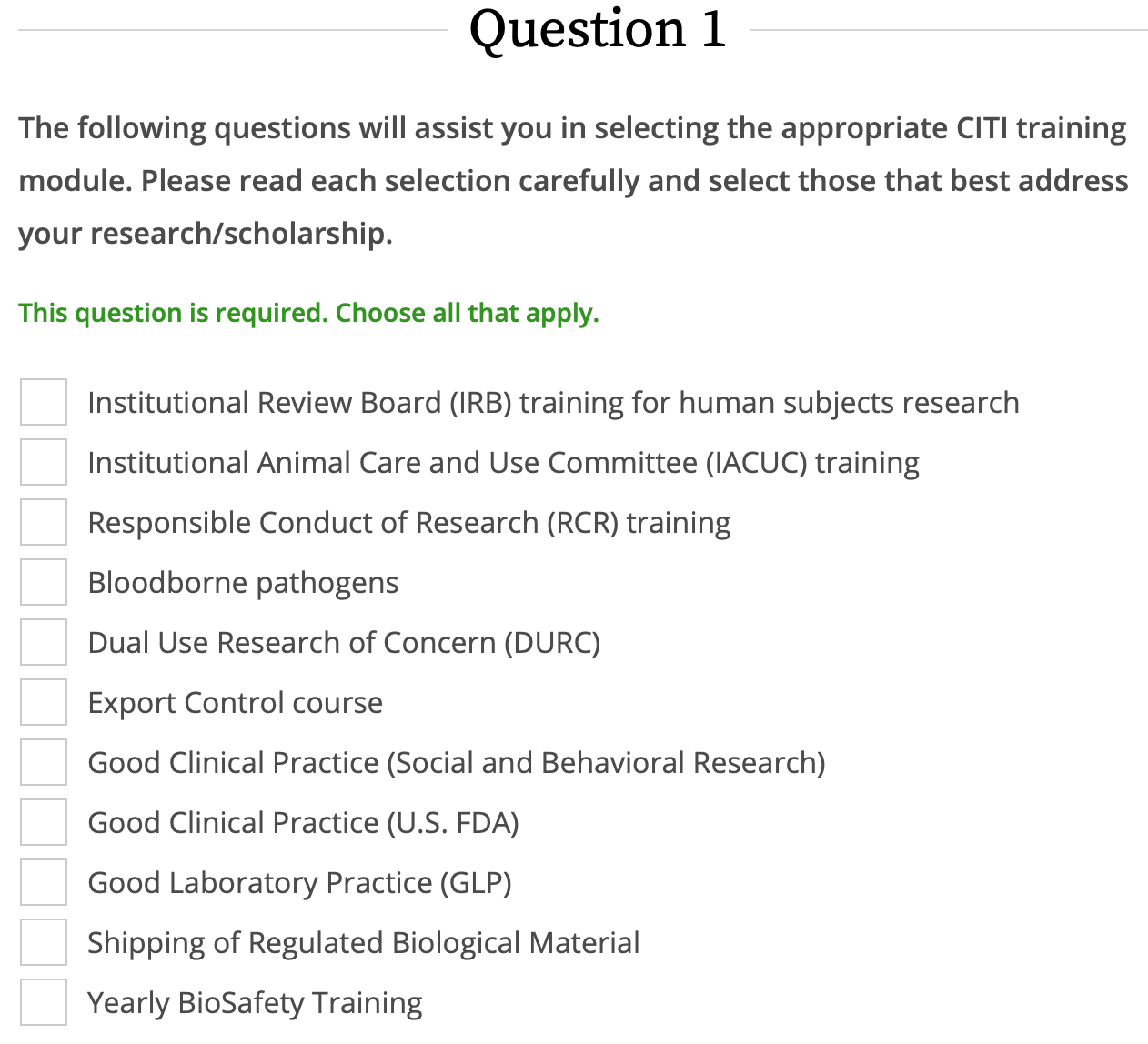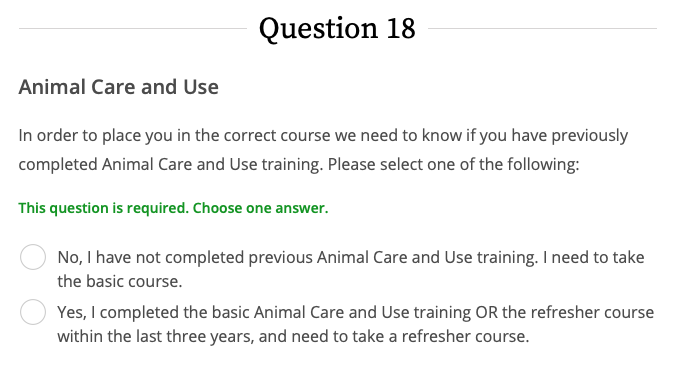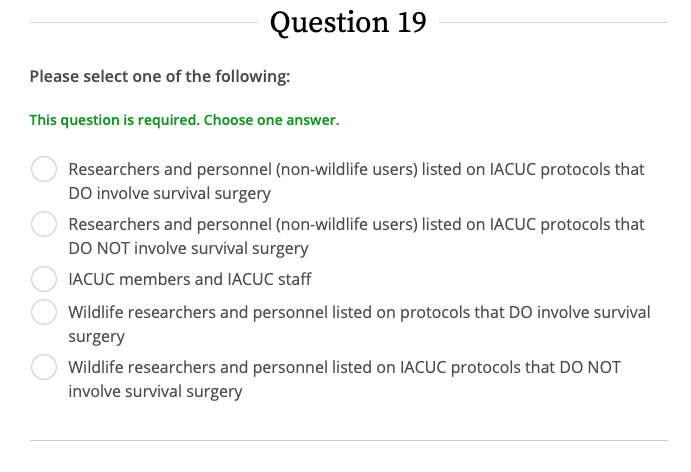IACUC Trainings and Occupational Medical Assessment
Need to submit to the IACUC and not sure where to begin? Review our Basic Steps. Click on the button below for additional educational resources for submission to the IACUC, including videos and how-to instructions.
Click Here for Educational Resources
For assistance determining which training is required for your research activities, use this training decision-making tool. Below are the various required trainings for IACUC approval.
Occupational Health
All staff, students, faculty, visitors, volunteers working in the auspices of Penn State must complete the Occupational Health Assessment for Animal Care Personnel, which can be accessed at https://occhealthacp.psu.edu.
IACUC Rodent Surgery Training Tutorial
For an IACUC protocol that involves surgery with mice or rats, all personnel listed on the protocol must also complete the IACUC Rodent Surgery Training Tutorial. This training is required even if personnel on the protocol will not be involved in the surgical procedures. The online training modules are available any time. There are also ARP Rodent training classes offered once a month. Learn more about ARP Rodent training classes.
IACUC Animal Hazard Safety Training
For an IACUC protocol that involves the use of hazardous materials with animals, all personnel listed on the protocol must also complete the IACUC Animal Hazard Safety Training including the associated quiz. This training is required even if personnel on the protocol will not be directly involved in the handling of the hazard. After completing the online training and associated quiz, personnel working directly with the hazards and animals should contact the Animal Resource Program (ARP) at arp@psu.edu to schedule in person facility training. The online training modules are available at any time and any questions should be directed to ARP (arp@psu.edu).
CITI
In addition, all study team members of a protocol submission must complete the appropriate training in CITI.
- Penn State affiliated personnel can access CITI using this link: http://citi.psu.edu
- Non-Penn State affiliated personnel cam access CITI using this link: https://citiprogram.org
At least one of the following basic CITI courses is required as an initial training:
- Researchers (Personnel listed on IACUC Protocols)
- Researchers (Not involved in survival surgery)
- Wildlife & aseptic surgery (for non-reptile users)
- Wildlife & aseptic surgery (for non-reptile)
- Wildlife no surgery (for reptile users)
- Wildlife no surgery (for non-reptile users)
In addition to the basic courses above, study personnel working with laboratory or agricultural species must complete species specific training. Wildlife users will take the appropriate course (reptile/non-reptile, surgery/no surgery).
Study personnel who have already completed a basic course (listed above) or a previous refresher course with the Penn State University Park IACUC will need to complete a refresher course every three years. All refresher courses have the same content.
Click on the dropdown link below to view instructions on how to add a CITI course.
To determine the appropriate course required for your research, navigate through the questions to “Add a Course” (see picture below). CITI will add courses to your profile depending on your answers.

After selecting “Add a Course,” check “IACUC training" for Question 1 (pictured below).

Question 18 allows you to select if you need a basic course (for those who have not previously completed an IACUC course in CITI) or a refresher course (for those who have already taken a basic or previous refresher course).
Note: If you select that you “Yes” in Question 18, the “Working with the IACUC- Refresher Course” will be automatically added to your course listed. Anytime you need a different IACUC category or species you will need to go back to “Add a Course” and check “No…” to the above question to add additional courses, even if you have already completed the basic or refresher course previously.

Question 19 is where you will identify your research by species type and need for survival surgery:
- Lab animals/agricultural animals for protocols that DO/DO not involve survival surgery (see Question 21)
- Wildlife animals for protocols that DO/DO not involve survival surgery (see Question 22)

Question 21: Agriculture/Lab/Other Animals
Select all species that are on the protocol you will work under.
Question 22: Wildlife Animals
Select the appropriate option to indicate if you will work with reptiles.
